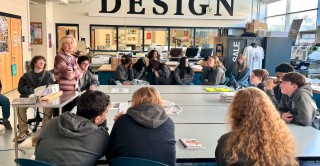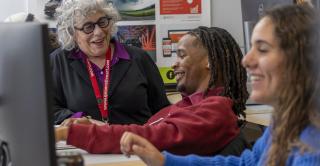
Enhance the Student Experience.
Share your passion for college experience by working with students to help them get most from their educational experience. With Central’s MS in Development Higher Education program, you’ll learn foundations of field student affairs/services an emphasis on development, counseling, and utilizing a social justice framework.
A theory practice model is used develop practical skills be successful students. Open door developing career in:
- Residence Life
- Academic Advising
- Career Services
- Learning Centers
- Student Activities
- Tutoring
- First Generation Centers
- Multicultural/Inter-cultural Centers
- Residence Life
- Academic Advising
- Career Services
- Learning Centers
- Student Activities
- Tutoring
- First Generation Centers
- Multicultural/Inter-cultural Centers
Program Features
- Starts every May
- 36-credit program
- Attend full- or part-time
- Classes on-campus and online
- Extensive internship program
- Scholarship opportunities
- Financial aid is available
- No GMAT/GRE required
- We follow the Master's Level Higher Education and Student Affairs Professional Preparation Programs standards set by CAS (Council for the Advancement of Standards in Higher Education).
Student Development in Higher Education Specialization Objectives
Students are able to:
Learning Objective 1: Articulate and apply knowledge of theory, practice, and ethical standards relative to the practice of Student Development in Higher Education;
CAS 5a.1 (5.2); CAS 5a2. (5.2) [Foundational Content]
Learning Objective 2: Demonstrate appropriate counseling, advising, and group facilitation techniques for use with students, staff, and faculty in higher education.
CAS 5b.3 (5.6) [Individual and Group strategies]
Learning Objective 3: Demonstrate the ability to use and critique appropriate Student Development theory to understand, support, and advocate for student learning and development by assessing needs and creating opportunities for the learning and development.
CAS 5b.1 (5.4); CAS 5b.5 (5.8) [Student learning and identity/psychosocial developmental theory; Assessment, evaluation and research]
Learning Objective 4: Identify the effects of their cultural worldview with an emphasis placed on the development of culturally appropriate skills for use with diverse populations and the development of various learning approaches to support student, faculty and staff on a college campus.
CAS 5b.2 (5.5) [Student characteristics and Effects of Higher Education on Students (Cultural competence)]
Learning Objective 5: Identify and apply knowledge of federal and state laws pertinent to the roles and functions of student development professionals and to the responsible management of colleges and Universities.
CAS 5b.4 (5.7) [Organization and Administration of Higher Education and Student Affairs]



